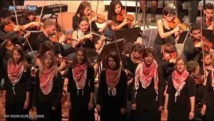
Logistics and political factors had prevented "Symphony for Palestine" from going being taken to the West Bank since its launch three years ago, co-producers Markus Rindt and Benjamin Deiss said.
"There were many (Palestinian) musicians we just couldn't work with" due to restrictions of movement in place under the Israeli army, Deiss explained.
All the Palestinian musicians on the project had to be ones based in annexed Arab east Jerusalem, with Israeli-issued ID cards that allow them freedom of movement, he said.
And Iranian composer Kalhor was unable to attend because of the hostile relations between Israel and Iran.
"He was afraid he wouldn't be able to return to his homeland after going through Israel," Rindt said.
"We only got visas for the Azerbaijanis on Friday last week," he added.
The symphony fuses eastern and western melodies and saw traditional Arabian lutes or ouds and Azerbaijani bowed kamanchehs and plucked qanuns backed by the German city of Dresden's symphony orchestra, the Dresdner Sinfoniker.
The concert, which features almost 30 musicians, will be also performed in east Jerusalem and in northern West Bank city of Jenin where slain producer Juliano Mer Khamis's Freedom Theatre was based.
Rindt said he hoped the families of both Mer Khamis and slain teen Ahmed Khatib whose parents donated his organs to five Israeli children could attend the Jenin perfomance.
"That would be very special," he said.
The Palestinians on the project hoped the experience of travelling to Ramallah and Jenin would help their European fellow musicians understand the political situation better.
"It took us a long time to pass through the checkpoint to get here from Jerusalem," said oud (Arabian lute) player Emil Muin Bishara, originally from Nazareth.
"This experience means the German musicians can see the Palestinians' situation first-hand. They can sympathise with it but can't fully understand it until they come here," he said.
Palestinian deputy information minister Mahmud Khalifa, who joined the sell-out crowd at the Ramallah Cultural Palace on Thursday, said the performance "brought people together."
"These concerts are important because they project a better image of Palestinians to the world, showing that it's not just war and intifada here."
--------------------------------------------------------------------------------------------------------------
"There were many (Palestinian) musicians we just couldn't work with" due to restrictions of movement in place under the Israeli army, Deiss explained.
All the Palestinian musicians on the project had to be ones based in annexed Arab east Jerusalem, with Israeli-issued ID cards that allow them freedom of movement, he said.
And Iranian composer Kalhor was unable to attend because of the hostile relations between Israel and Iran.
"He was afraid he wouldn't be able to return to his homeland after going through Israel," Rindt said.
"We only got visas for the Azerbaijanis on Friday last week," he added.
The symphony fuses eastern and western melodies and saw traditional Arabian lutes or ouds and Azerbaijani bowed kamanchehs and plucked qanuns backed by the German city of Dresden's symphony orchestra, the Dresdner Sinfoniker.
The concert, which features almost 30 musicians, will be also performed in east Jerusalem and in northern West Bank city of Jenin where slain producer Juliano Mer Khamis's Freedom Theatre was based.
Rindt said he hoped the families of both Mer Khamis and slain teen Ahmed Khatib whose parents donated his organs to five Israeli children could attend the Jenin perfomance.
"That would be very special," he said.
The Palestinians on the project hoped the experience of travelling to Ramallah and Jenin would help their European fellow musicians understand the political situation better.
"It took us a long time to pass through the checkpoint to get here from Jerusalem," said oud (Arabian lute) player Emil Muin Bishara, originally from Nazareth.
"This experience means the German musicians can see the Palestinians' situation first-hand. They can sympathise with it but can't fully understand it until they come here," he said.
Palestinian deputy information minister Mahmud Khalifa, who joined the sell-out crowd at the Ramallah Cultural Palace on Thursday, said the performance "brought people together."
"These concerts are important because they project a better image of Palestinians to the world, showing that it's not just war and intifada here."
--------------------------------------------------------------------------------------------------------------









 Home
Home Politics
Politics









